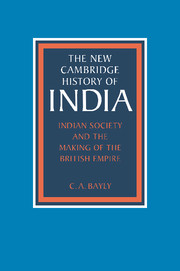Book contents
- Frontmatter
- Introduction
- 1 India in the eighteenth century: the formation of states and social groups
- 2 Indian capital and the emergence of colonial society
- 3 The crisis of the Indian state, 1780–1820
- 4 The consolidation and failure of the East India Company's state, 1818–57
- 5 Peasant and Brahmin: consolidating ‘traditional’ society
- 6 Rebellion and reconstruction
- Conclusion: the first age of colonialism in India
- Glossary of indian terms
- Bibliographical essay
- Index
- THE NEW CAMBRIDGE HISTORY OF INDIA
- Plate Section"
Introduction
Published online by Cambridge University Press: 28 March 2008
- Frontmatter
- Introduction
- 1 India in the eighteenth century: the formation of states and social groups
- 2 Indian capital and the emergence of colonial society
- 3 The crisis of the Indian state, 1780–1820
- 4 The consolidation and failure of the East India Company's state, 1818–57
- 5 Peasant and Brahmin: consolidating ‘traditional’ society
- 6 Rebellion and reconstruction
- Conclusion: the first age of colonialism in India
- Glossary of indian terms
- Bibliographical essay
- Index
- THE NEW CAMBRIDGE HISTORY OF INDIA
- Plate Section"
Summary
When H. H. Dodwell published his fifth volume of the Cambridge History of India in 1929, this book also became the fourth volume of the Cambridge History of the British Empire. The aim of the work was to chronicle the conquest of India by British arms and its transformation by British institutions. This must have seemed a very appropriate theme in the years just preceding the Statute of Westminster of 1931, which laid new foundations for the British Empire and Commonwealth. But since that date there has been a considerable change of perspective. Historians working after 1929 have, if anything, emphasised the importance of India to Britain's world rôle in the nineteenth century even more strongly. However, the nature and extent of India's transformation has been vigorously debated from perspectives that would have seemed alien, even offensive to the interwar authors.
The importance of India for Britain's imperial system lay in both the military and economic fields. Seizure of the cash land revenues of India between 1757 and 1818 made it possible for Britain to build up one of the largest European-style standing armies in the world, thus critically augmenting British land forces which were small and logistically backward except for a few years during the final struggle with Napoleon. This Indian army was used in large measure to hold down the subcontinent itself, but after 1790 it was increasingly employed to forward British interests in southern and eastern Asia and the Middle East. More symbolically, the Indian army opened up a second front, as it were, against the other great Eurasian land powers, Russia, the Ottomans, France and Austria.
- Type
- Chapter
- Information
- Publisher: Cambridge University PressPrint publication year: 1988

